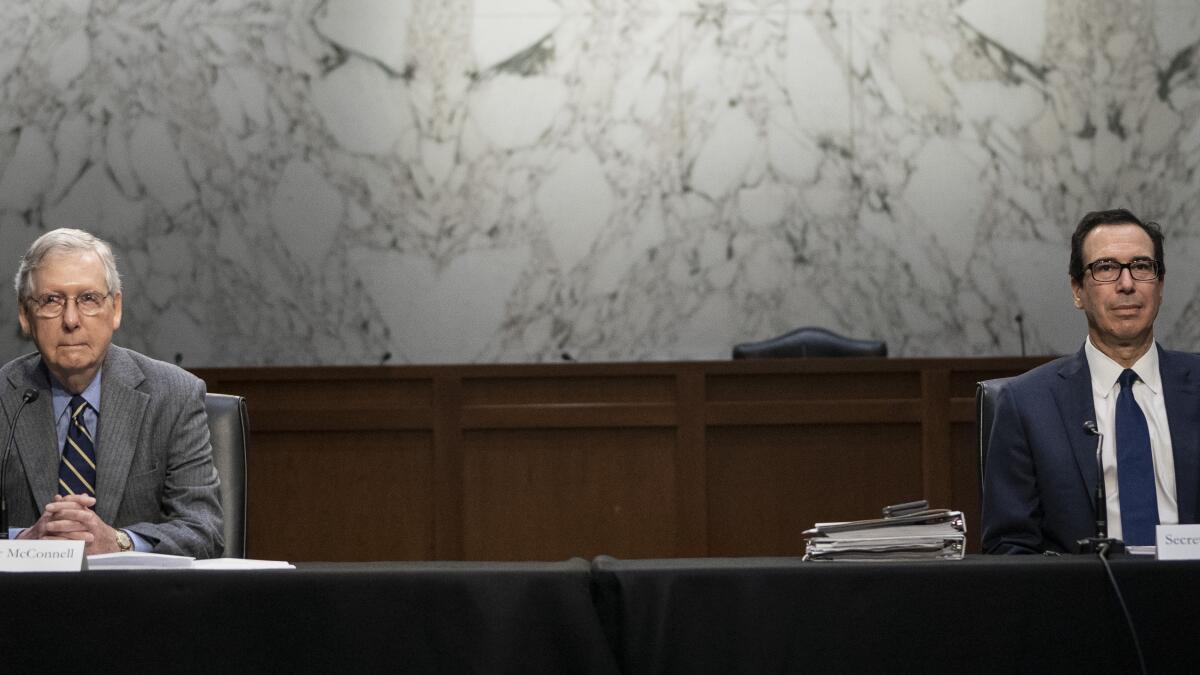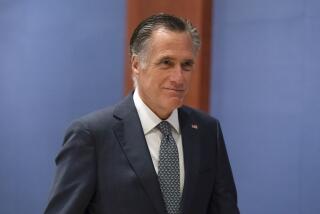Lawmakers race to reach coronavirus stimulus deal despite disagreements over checks to taxpayers

WASHINGTON — The Senate and White House are scrambling to cut a deal on a potentially $1-trillion-plus stimulus plan to help the economy survive the COVID-19 pandemic, with a goal of reaching an agreement by Friday night.
President Trump said at a White House briefing that progress was being made and that he had recently spoken with Senate Majority Leader Mitch McConnell (R-Ky.) and Senate Minority Leader Charles E. Schumer (D-N.Y.).
“The Democrats are very much wanting something to happen, and the Republicans likewise are very much wanting something to happen,” he said. “There’s a tremendous spirit to get something done, so we’ll see what happens.”
Senators were working in four bipartisan groups to nail down details of the legislation, and Treasury Secretary Steven T. Mnuchin wants a vote on the Senate floor Monday.
“The need for urgency has been pressed repeatedly by the president and the secretary, and we’re going to work very hard to be incredibly nimble, quite quick, again so that we’re in a position where results and relief can be delivered to the American people as soon as possible,” Eric Ueland, the White House director of legislative affairs, told reporters on Capitol Hill.
However, there have been persistent disagreements on what the legislation should include, specifically how to distribute individual payments to most taxpayers.
The Senate Republican plan, which was detailed on Thursday, includes as much as $1,200 per person or $2,400 per couple. An additional $500 would be given per child. Payments would be lower for individuals making more than $75,000 or couples making more than $150,000.
But there’s resistance from some Republicans who feel it’s not targeted enough toward people who need the financial support and from some Democrats who believe it’s inadequate. With the debate underway behind closed doors, Ueland would not say whether the final plan would include direct payments to Americans.
“The American people will receive significant relief as quickly as available,” he said.
House Speaker Nancy Pelosi (D-San Francisco) has also been in regular contact with Mnuchin.
Chuck Marr, a tax policy expert at the Center on Budget and Policy Priorities who previously worked for Democrats on Capitol Hill, said the Republican proposal “is poorly designed and completely upside down.”
Workers who make the least money would be eligible for only $600 per adult, rather than the $1,200 available to members of the middle class. Marr also warned that allowing the Internal Revenue Service to distribute the money would be ineffective because many poor Americans don’t file federal tax returns.
“The people here who are most vulnerable are low wage workers. And they’re the ones being shortchanged,” he said. “It’s unacceptable.”
Paul Winfree, a Heritage Foundation economic expert who previously worked on domestic and budget policy in the White House, was also skeptical of the Republican proposal to distribute payments.
“If we’re sending everybody out a check, I’m afraid it won’t be enough for people who are furloughed and losing their jobs. But it’s essentially unneeded for people who are still working,” he said. “It’s not enough for some and too much for others.”
Winfree was more positive about a different part of the Republican proposal, which would distribute $300 billion in loans to small businesses that don’t lay off their workers. He said it’s better to keep workers connected to their employers because it would help businesses rev back up once the pandemic passes.
“This is not a traditional recession right now,” Winfree said. “This is a recession that is tied to a specific disease that will hopefully go away at some point. All focus should be on restarting the economy when that happens.”
More to Read
Get the L.A. Times Politics newsletter
Deeply reported insights into legislation, politics and policy from Sacramento, Washington and beyond. In your inbox three times per week.
You may occasionally receive promotional content from the Los Angeles Times.












